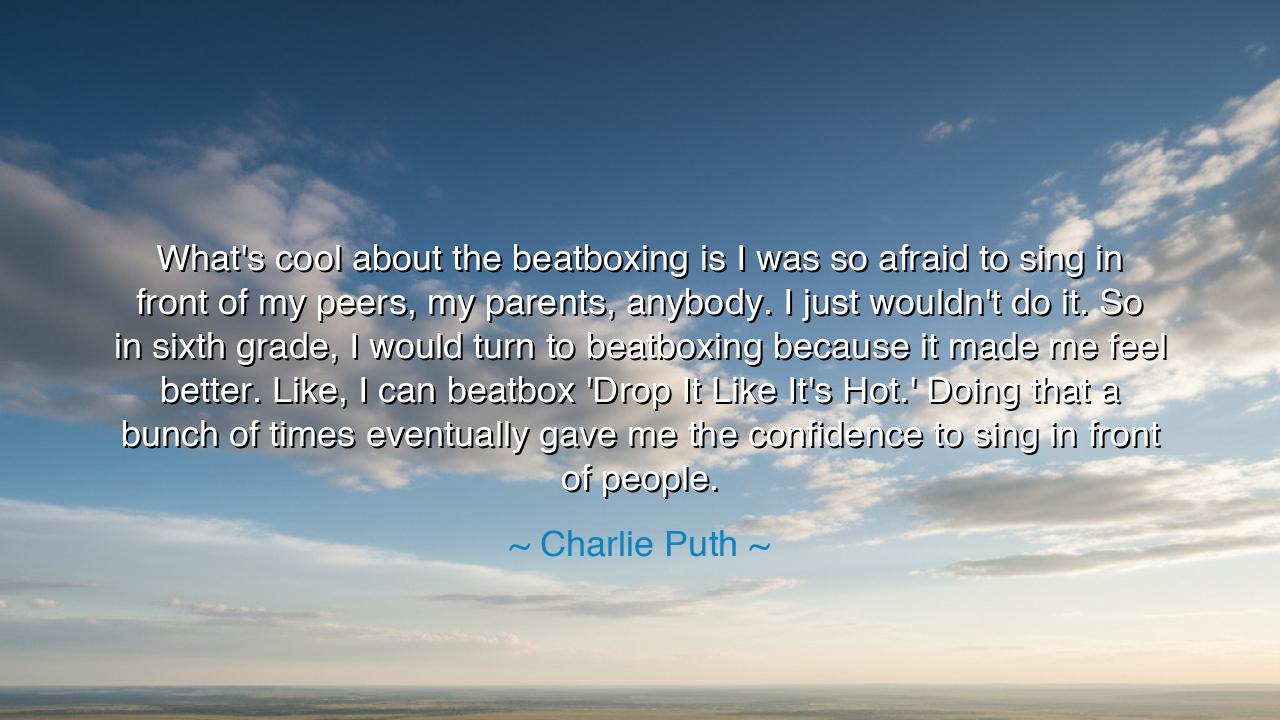
What's cool about the beatboxing is I was so afraid to sing in
What's cool about the beatboxing is I was so afraid to sing in front of my peers, my parents, anybody. I just wouldn't do it. So in sixth grade, I would turn to beatboxing because it made me feel better. Like, I can beatbox 'Drop It Like It's Hot.' Doing that a bunch of times eventually gave me the confidence to sing in front of people.






"What's cool about the beatboxing is I was so afraid to sing in front of my peers, my parents, anybody. I just wouldn't do it. So in sixth grade, I would turn to beatboxing because it made me feel better. Like, I can beatbox 'Drop It Like It's Hot.' Doing that a bunch of times eventually gave me the confidence to sing in front of people." These words by Charlie Puth reveal a deep truth about the human experience—how fear can stifle our potential, but how the smallest steps of courage can open the path to great confidence. Puth speaks of a personal transformation, where beatboxing, initially a method of self-soothing and avoiding the fear of singing, became the key to unlocking his self-expression. The act of doing something that made him feel empowered—no matter how small or unconventional—gave him the confidence to eventually overcome his fear and share his true talents with the world.
In the ancient world, fear was seen not just as an emotion, but as a force that could either bind us to inaction or drive us toward greatness. Socrates, the Greek philosopher, emphasized the importance of courage and self-examination in overcoming the fear that holds us back. He believed that true wisdom comes when we face our fears directly, not with brute force but with a sense of understanding and humility. Socrates knew that self-improvement often begins with the smallest acts of courage—the willingness to engage with our weaknesses and move beyond them. Much like Puth’s journey, it is through these seemingly small victories—like beatboxing in private—that we find the strength to take the bigger steps forward.
Similarly, the Stoics, like Marcus Aurelius, taught that true virtue lies not in avoiding fear, but in acting despite it. Aurelius often wrote in his Meditations that fear is a natural emotion, but it is not something to be fleeing from. Rather, the key is to engage with it, to perform the task at hand with full knowledge that fear will often be present, but should not control our actions. The act of beatboxing as a way to build courage echoes the Stoic approach—embracing a small act that helps us build confidence and desensitize ourselves to the larger fears that hold us back. Puth’s example of overcoming fear through repeated acts of courage mirrors the Stoic resilience: taking action, no matter how small, to ultimately conquer the larger challenge.
The story of King David in ancient Israel offers a powerful real-life example of overcoming fear with small steps. Before he faced Goliath, David was just a shepherd boy, armed only with a slingshot and his deep faith in his ability. He had confidence because of his previous experiences in protecting his flock from lions and bears. David’s courage didn’t come from a single moment of bravery but from a long history of facing small challenges and building the strength to confront the larger ones. Like Charlie Puth, who began with the small act of beatboxing, David’s victory began with his willingness to take on the smaller, everyday challenges that eventually gave him the strength to face his Goliath.
This story reminds us that confidence doesn’t appear overnight—it is built through the steady accumulation of small acts of courage. The fear that holds us back from doing something as simple as singing or speaking in front of others is a common human experience. But by taking small steps, like Puth’s beatboxing, we can slowly build the strength needed to eventually overcome our larger fears. Puth’s journey teaches us that even the most unconventional methods—things that seem trivial or silly at first—can be the very thing that empowers us to achieve something far greater. Through his beatboxing, he found a way to build confidence, eventually using his voice to sing and share his artistry with the world.
The lesson here is clear: fear is not an enemy, but a natural part of our journey. Confidence is not something that comes from avoiding fear, but from engaging with it in small, manageable ways. Every step we take toward overcoming fear—no matter how small it seems—becomes a part of our growth. Just as Charlie Puth learned to sing by starting with the smaller, seemingly insignificant act of beatboxing, we, too, can confront our fears in ways that may seem insignificant at first, but eventually lead us to greater strength and self-expression.
In our own lives, we must take small steps to confront the fears that hold us back, whether they be in our careers, our relationships, or our personal growth. Let us take a lesson from Puth’s journey and recognize that the act of beginning, no matter how small or imperfect, is often the key to overcoming our deepest insecurities. Whether it’s writing, speaking, or performing, the path to confidence begins with taking one small step—embracing it fully, without concern for perfection, but for the courage it takes to start. By doing so, we lay the foundation for our greatest achievements, just as Puth did with his beatboxing. Courage, then, is not about the absence of fear, but about the willingness to act despite it.






AAdministratorAdministrator
Welcome, honored guests. Please leave a comment, we will respond soon